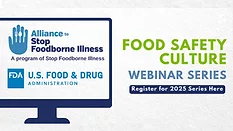
FDA
The U.S. Food and Drug Administration (FDA) is responsible for regulating about 80 percent of the U.S. food supply, encompassing all foods and food ingredients introduced into or offered for sale in interstate commerce, except for meat, poultry, certain processed egg products, and catfish, which are regulated by the U.S. Department of Agriculture (USDA).
Articles
-

-

-

The Signal to Start: How the FDA CORE Signals and Surveillance Team Evaluates and Identifies Foodborne Illness Outbreaks
By: Ashley Grant M.P.H., Tyann Blessington Ph.D., M.S., M.P.H., Daniela Schoelen Ph.D., M.P.H., Stelios Viazis Ph.D., Cary Chen Parker M.P.H., Anders Evenson, Stuart L. Cantor PhD and Jennifer Beal M.P.H -

Podcasts
More PodcastsNever miss the latest news and trends driving the food safety industry
eNewsletter | Website | eMagazine
JOIN TODAY!Copyright ©2025. All Rights Reserved BNP Media.
Design, CMS, Hosting & Web Development :: ePublishing
